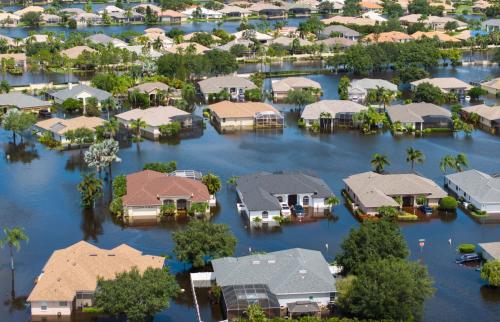Last week, Nigeria and Chad called on the African Union and international donors to raise $50 billion to “recharge” the drying Lake Chad. The project would recharge the lake using resources from another central African body of water: the Ubangi River. Nigeria has already spent $5 million on a study looking at the feasibility of recharging the lake.
The lake has been considerably shrinking since 1963, as seen in the below figure from the chapter on Confronting Climate Change in Foresight Africa 2017. Between 1963 and 2013, the lake lost 90 percent of its water mass, shrinking from 25,000km2 to 2,500km2. The reduction in the size of the lake has threatened the resources and livelihoods of the 50 million residents in that region. Another challenge in the region is the threat posed by the Boko Haram insurgency. There are 2.8 million refugees in the Lake Chad region, and estimates state that there are 9.2 million people in need of humanitarian assistance in the region.
 According to Aliou Dia, the UNDP Africa’s Disaster Risk Reduction and Climate Change team leader, climate change might exacerbate current tensions and conflict. He says that radicalization arises from religious, ideological, economic, and historical situations where social, employment, poverty, and governance problems, among others, have created social exclusion and mistrust, adding, “Climate change, on the other hand, affects our natural capital (water, food, land, forest, biodiversity, etc.). Compounded with more frequent occurrence of natural disasters (drought, floods, landslides, cyclones, etc.), it leads to disruption, as livelihoods are affected and local economic opportunities lost. The inability of fragile governments to meet the needs of their population or provide protection in the face of climate change-induced hardship can trigger frustration, lead to tensions between different ethnic and religious groups within countries and to political radicalization. This could destabilize countries and even entire regions.” The question over whether climate change causes conflict, though, is still under debate, as seen in Dr. Vesselin Popovski’s Foresight Africa 2017 viewpoint.
According to Aliou Dia, the UNDP Africa’s Disaster Risk Reduction and Climate Change team leader, climate change might exacerbate current tensions and conflict. He says that radicalization arises from religious, ideological, economic, and historical situations where social, employment, poverty, and governance problems, among others, have created social exclusion and mistrust, adding, “Climate change, on the other hand, affects our natural capital (water, food, land, forest, biodiversity, etc.). Compounded with more frequent occurrence of natural disasters (drought, floods, landslides, cyclones, etc.), it leads to disruption, as livelihoods are affected and local economic opportunities lost. The inability of fragile governments to meet the needs of their population or provide protection in the face of climate change-induced hardship can trigger frustration, lead to tensions between different ethnic and religious groups within countries and to political radicalization. This could destabilize countries and even entire regions.” The question over whether climate change causes conflict, though, is still under debate, as seen in Dr. Vesselin Popovski’s Foresight Africa 2017 viewpoint.
The Lake Chad region is not the only Africa region affected by severe climate conditions. The El Nino-induced drought has caused widespread hunger through Eastern and Southern Africa. Last month, Kenyan members of parliament urged the national government to declare hunger a national crisis in the aim to attract the necessary international attention. According to the Food and Agriculture Organization (FAO), in Somalia, Ethiopia and Kenya, nearly 12 million people are struggling to feed themselves amid low rainfall, poor harvest, and livestock deaths. The FAO has issued a pre-famine warning and is urging the community to act promptly in order to avoid a repeat of the 2011 famine that left 260,000 people dead.
Correction: On April 24, 2017, it came to our attention that the river used to recharge Lake Chad was incorrectly identified as the Rangin River. The statement has been corrected to identify the Ubangi River.
The Brookings Institution is committed to quality, independence, and impact.
We are supported by a diverse array of funders. In line with our values and policies, each Brookings publication represents the sole views of its author(s).






Commentary
Figure of the week: The shrinking Lake Chad
February 9, 2017